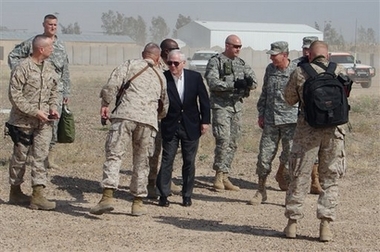Gates: 'Clock Is Ticking' on Iraq
(AP)Updated: 2007-04-20 06:53
 US Defense Secretary Robert Gates arrives at Camp Falluja, Iraq, after visiting Baghdad, Thursday, April 19, 2007, and is greeted by soldiers and top military commanders. [AP]  |
A suicide bomber infiltrated the parliament building in the heavily fortified Green Zone a week ago, dealing a blow to the US-led effort to pacify the capital's streets.
Prime Minister Nouri al-Maliki called the violence in Baghdad an "open battle."
Gates, traveling to Iraq for the third time in four months, took a decidedly stronger tone this time, reflecting US frustration and the political tumult in Washington, where President Bush and Congress are deadlocked over whether to set an end date for the war.
Since January, when Bush announced his new strategy for the Iraq war - featuring a troop buildup and a renewed push for economic development and political progress - Gates and other senior administration officials have frequently and publicly reminded the Iraqis that they must act quickly to settle their differences. They have attempted to strike a balance between pressuring the Iraqis to reconcile and reassuring them that the US military will not abandon them while they struggle to avert a full-scale civil war.
Gates said again Thursday that the Washington debate has been helpful in letting the Iraqis know that American patience with the war is ebbing. Democrats have seized on those remarks to bolster their arguments that there must be a deadline for the Pentagon to begin withdrawing troops from Iraq.
The last time a US defense secretary visited Fallujah - which until late 2004 was a key stronghold of the Sunni insurgency - it was Donald H. Rumsfeld, who stopped here in December 2005 to announce a plan to begin reducing US troops. Small reductions were made, but shortly afterward troop levels began climbing again. In February 2006, the spectacular bombing of a mosque in Samarra, north of Baghdad, set off a wave of sectarian retribution and a surge of civilian deaths that scuttled US plans to pull out more troops.
Gates said the Iraqis must, as quickly as possible, push through legislation on political reconciliation and the sharing of oil revenues among the Sunnis, Shiites and Kurds.
| 1 | 2 |  |
|
||
|
||
|
|
